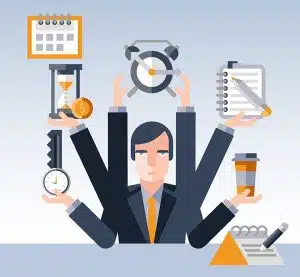Symptoms of ADHD in Adults

Are you constantly forgetting your cell phone or your wallet on the subway or at home? Do you find it hard to focus on assignments at work or find yourself running late to events or appointments? What about your frustration tolerance, do you get angry easily, especially when you feel overwhelmed?
The above symptoms occur in almost all adults at some point in their lives, but if these symptoms of forgetfulness, disorganization, and mood swings are a common occurrence, you may have ADHD. Adults with ADHD commonly report having having difficulty paying attention, controlling impulses and remaining focused on challenging tasks.
While ADHD is typically diagnosed during childhood, in many cases it continues on into adult hood. Also, there are times when ADHD was never diagnosed in childhood because certain behaviors were viewed as typical childhood behavior.
AHD with Adults vs Children
ADHD looks different in children than in adults which is why adults may not realize they have it. Children with ADHD tend to talk out of turn, run around and fidget which fits the criteria of what people believe is ADHD.
Adults, who are more mature and adhere to social norms, do not act this way. In adults, unlike in children, the symptom of “hyper focus” can be found. Hyperfocus refers to someone being extremely absorbed in a rewarding task, leaving them distracted from everything else. Also, adults with ADHD are more likely to abuse drugs and alcohol and engage in reckless driving.
Adults contain a lot more responsibilities than children do such as managing a family, a career, as well as personal responsibilities. Symptoms of ADHD can be triggered by someone feeling overwhelmed and struggling with many tasks at the same time. If you are an adult with ADHD, your symptoms can impact your quality of life and cause you to feel stressed out.
Relationships for Adults with ADHD
Adults with ADHD can have trouble managing relationships ranging from romantic relationships, friendships and work relationships. Surveys have found that there are higher driver rates in marriages where one partner has ADHD.
In terms of romantic relationships ,the partners with ADHD at times can feel like they are being criticized because of their ADHD symptoms and become over-sensitive. The partner without ADHD can feel ignored or that he or she has to do all the responsible tasks and planning.
Someone with ADHD can accidentally day dream during important conversations or impulsively say a hurtful comment. People with ADHD experience emotions very strongly and in the heat of the moment, they can react automatically.
To work on relationships and anger issues, people with ADHD can manage their stress levels and learn what situations cause them to outburst (to prevent them in the future)
Self-help tips for Adults with ADHD
1. Exercise (relieves stress)
2. Eat a well balanced diet
3. Sleep 7-9 hours a night
4. Time management: Plan out getting places on time and create schedules
5. Work environment: Keep everything organized and make "to do" lists
Adults with ADHD have meaningful relationships and can successfully manage their symptoms. People with ADHD are creative, motivated and experience emotions greatly which makes them sensitive partners and loyal friends. If you are an adult who just found out you have ADHD or suspect you may have it, you should see a psychologist for an initial evaluation. If a diagnosis is made, you can create an individualized treatment plan with your clinician to best meet your needs and your schedule .
Work Cited
https://www.psychologytoday.com/blog/the-distracted-couple/201401/the-price-fury-0
https://www.adultadhd.net/childhood-vs-adult/
https://www.mayoclinic.org/diseases-conditions/adult-adhd/home/ovc-20198864
https://www.helpguide.org/articles/add-adhd/adhd-attention-deficit-disorder-in-adults.htm

